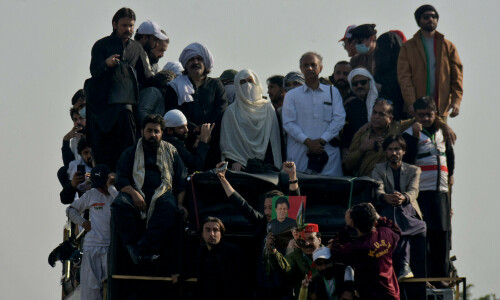NEW YORK, Aug 5: President Gen Pervez Musharraf said in an interview with a magazine that he believed that while Osama bin Laden was “sponsor, the financier, and the motivating force” behind the Sept 11 attacks on US, “the plan was executed by others.”
“I didn’t think it possible that Osama sitting up there in the mountains could do it,” Musharraf told The New Yorker.
“He was perhaps the sponsor, the financier, the motivating force. But those who executed it were much more modern. They knew the US, they knew aviation. I don’t think he has the intelligence or the minute planning. The planner was someone else,” the General said.
The magazine said Musharraf, whose support for the United States in the war in Afghanistan has earned him the popular nickname Busharraf, talks to Hilton, the interviewer, about all of the tumultuous political events that have occurred since he took power in a coup in 1999.
“You can’t do one hundred per cent,” Musharraf said. “But I have taken the country out of the morass that it was in. It has been two and a half years of tremendous danger but I can say with satisfaction that my government has done well.”
Musharraf, the magazine said, complained that “the West saw me as a dictator, an aberration to democracy. They should have seen how I am governing. Is it dictatorial? Is it autocratic?
“Right now, I am Chief of Army Staff, Chief Executive, and President. What is power? Power is being Chief Executive. Taking decisions, running the government, undertaking development, running the economy, finance, developing the coastal highway, education. I am making these decisions. I am going to shed that power to the Prime Minister. So what’s left? I have to make sure that Pakistan is governed well. Is that unrealistic? I give him full authority. If he does not do well, I will check him.”
Musharraf goes on: “Elected governments played merry hell here.” Hilton notes that if Musharraf is to fulfil his ambitions, he must deal with the country’s alarmingly high rates of illiteracy, violence, and economic failure, while facing a great many hostile forces: Islamic fundamentalists who distrust his policies and threaten his life; a political opposition that would easily control a majority in an elected parliament, although its leaders live in exile; and even much of the middle class, which has become disillusioned with his military rule.
Musharraf reiterated that former Prime Minister Benazir Bhutto would “go to jail” if she returned to the country, but that if her party were to win the elections that the Supreme Court decreed must take place by October, then “they govern. And I will insure they govern honestly.”
The writer observed that the conflict in Kashmir and the decades-long struggle with India have shaped Musharraf’s political consciousness.
Musharraf’s role in the occupation of the high ground in Kargil, Kashmir, in 1999, which led to well over a thousand deaths and came closer than any other event to precipitating a nuclear exchange, is controversial, but one of Musharraf’s former teachers told the magazine that he personally rebukedMusharraf for his role. It was “a disaster of Musharraf’s making,” he says.
MUSHARRAF SAYS: “The people of Kashmir won’t give up. It has been our national interest since 1947, and we won’t give it up.”














































Dear visitor, the comments section is undergoing an overhaul and will return soon.